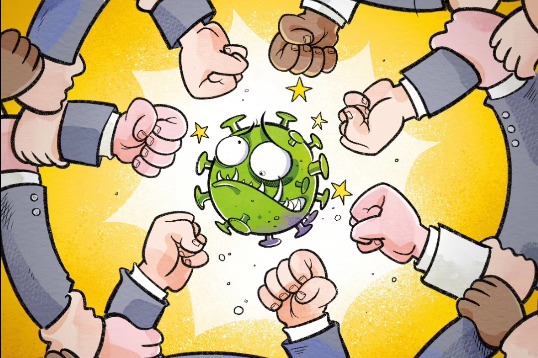International coordination must be enhanced to tackle pandemic crisis


A webinar on China-Europe economic cooperation amid the pandemic was hosted by the Chinese Academy of Social Sciences on Tuesday.
Experts agree the COVID-19 pandemic has caused new global challenges and the crisis in 2020 goes beyond economic and financial matters. Therefore, in addition to internal improvement, international cooperation is necessary for the European Union and China to solve the pandemic crisis, which will bring long-term side effects.
Xie Fuzhan, president of the Chinese Academy of Social Sciences, said China's "dual circulation" development pattern with the domestic market as a mainstay will promote China's opening up. Xie proposed that China and Europe's medium-term plans can provide a new opportunity for bilateral cooperation, such as China's upcoming 14th Five-Year Plan and the EU's recovery plan and the long-term budget for 2021-2027.
Renaud Dehousse, president of the European University Institute, said the EU has learned lessons from the 2008 economic crisis, so its response to the COVID-19 crisis was more rapid and effective.
"The economic slump has bottomed out," said Christoph M. Schmidt, president of the RWI-Leibniz Institute for Economic Research. "Yet, COVID-19 will weigh on global growth for quite some time."
Schmidt also said the EU will experience a threefold challenge: Managing economic recovery, avoiding internal divergence and maintaining global clout. He also stressed that global problems can only be solved by having a global approach.
Daniel Gros, director of the Center for European Policy Studies, said lessons from the last crisis were learned and were usefully applied in the first half of 2020, focusing on the key thing to prevent financial panic. However, the world needs new measures if thinking about the future.
Gros mentioned two points for measures against the crisis. First, the pandemic-caused crisis is a recession different from those about financial market development. It's a sectorial recession because people are not spending in peculiar sectors, such as tourism and services. Therefore, the challenge for the government is to ensure intervention in the sectors where there are problems.
Second, the government has to rethink and improve short-term work hours that employees work at home and companies get money from the government. The question is how to make sure that the help to the economy doesn't result in a frozen economy.
Kristof Lehmann, director for international monetary policy analysis and training of economic sciences in Hungary, said the Chinese recovery plays an important role in the world's recovery from the pandemic.
According to the changes that are reshaping the world, Bogdan Goralczyk, a professor at the University of Warsaw in Poland, suggested "new vocabulary in the pandemic era", including vaccine competition in political terms, pandemic elections in the United States and how far countries will go back to nation states.
Goralczyk said turning into nation states was the immediate reaction of many countries in face of the pandemic, which accelerated and will decide how deep deglobalization will become. Meanwhile, globalization needs a re-definition in the pandemic era.

































